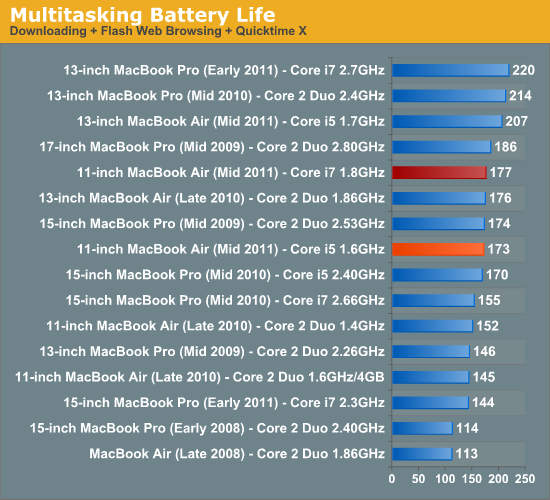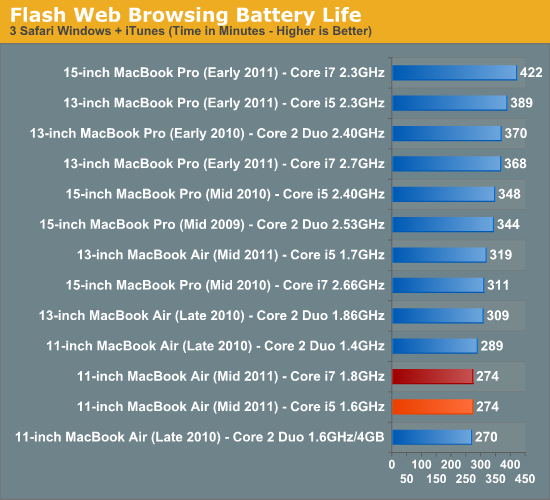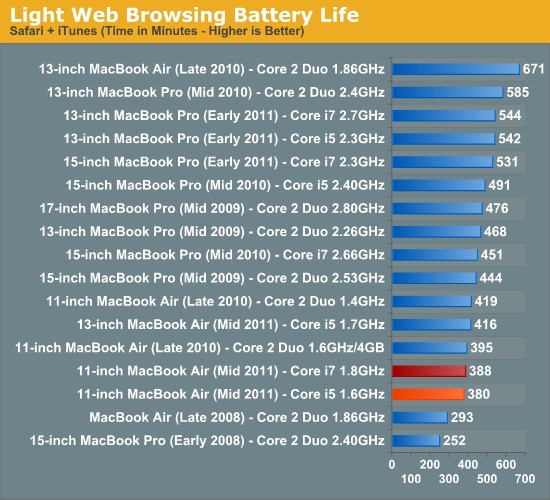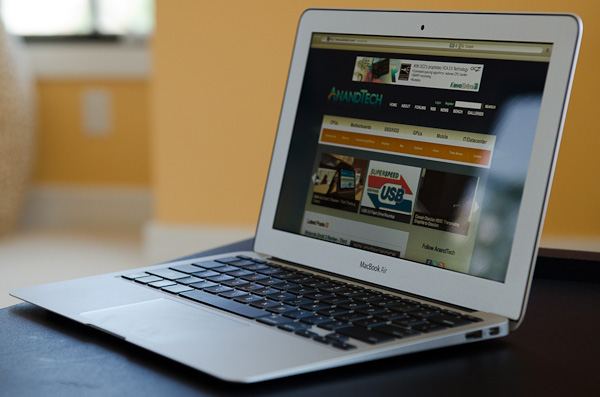Apple's 11-inch MacBook Air (Core i7 1.8GHz) Review Update
by Anand Lal Shimpi on August 1, 2011 6:08 PM EST- Posted in
- Mac
- Apple
- Intel
- Core i7
- Sandy Bridge
- MacBook Air
Battery Life
The 1.8GHz Core i7 doesn't run much faster by default than the 1.6GHz Core i5, but it can turbo up to a 25% higher clock speed than the Core i5. What's the impact on battery life?
If you're running a high CPU workload that never lets up in a continuous loop, the i7 is going to die quicker than the i5. Active power is greater at higher frequencies (assuming everything else remains the same) and with no chance to get to sleep the i7 will eat through the 35Wh battery faster than the i5.
Where the i7 stands a chance however is in workloads where you aren't running the CPU at full tilt all of the time. The i7 needs tiny, tiny, tiny fractions of a second of idle time to throttle down and go to sleep. It's in these sleep states that it'll draw very little power and avoid being a major consumer of that 35Wh (or 50Wh in the 13) battery. From the CPU's perspective, it wants to finish its work as quickly as possible so it can get back into its really low power idle states.
For workloads with balanced periods of load and idle time, the i7 should be able to at least equal the battery life of the i5. Short bursts of instructions can execute up to 25% faster on the i7, allowing it to go back to sleep that much quicker. Any energy expended from running at higher clock could be saved by spending more time at idle.
The other advantage is the larger L3 cache. A larger cache means a higher likelihood of finding data in that cache, which saves trips to main memory. Anytime you go off-chip for data the power penalty is tremendous. You have to fire up a powerful memory interface, drive requests back and forth over a high speed bus and actually pull the data from DRAM. The entire process is far more power intensive than just grabbing data from the CPU's on-die L3 cache. I wouldn't expect huge power savings from the L3 cache, but it's likely a net positive.
Our battery life tests are designed to run the gamut. Showing you the absolute best case use-your-notebook-as-a-typewriter light web browsing test to the get-stuff-done multitasking workload. I'd say most power users will see battery life similar to the worst case scenario, while mainstream users will be between that and the flash web browsing test. The writers in the crowd can shoot for the battery life in our lightest scenario if you really just spend your time in TextEdit.
All of our tests were run with dynamic brightness control disabled (panel brightness near 50% - we tried to equalize brightness across all systems) and the Macs were set to never go to sleep.
As you can see by the numbers below, there's basically no impact on battery life from the i7 upgrade. Note that none of these workloads keep the CPU pegged at 100% throughout the test. As I mentioned earlier, if you're going to be doing a long 3D render or compiling a very large project (multiple hours) you can expect worse battery life from the i7. Typical notebook usage models however shouldn't see much of a difference at all.
Multitasking Battery Life
In this test we have three open Safari windows, each browsing a set of web pages with between 1—4 flash ads per page, at the same time. We're also playing an XviD video in a window all while downloading files from a server at 500KB/s.

Flash Web Browsing
The test here has three Safari windows open, each browsing a set of web pages with between 1—4 animated flash ads per page, at the same time. Each page forwards onto the next after about 20 seconds.

Light Web Browsing
Here we're simply listening to MP3s in iTunes on repeat while browsing through a series of webpages with no flash on them. Each page forwards on to the next in the series after 20 seconds.












55 Comments
View All Comments
MobiusStrip - Tuesday, August 2, 2011 - link
Oh, but that's so Apple can keep everything running, all the time.It was bad enough that Mac OS apps don't quit when you "close" them. With Lion, Apple is taking this to new idiotic extremes.
It's just another example of Apple hypocrisy: The user is qualified to launch an app by himself, but not qualified to decide when to close it.
If Apple's mania for never quitting anything works so well, why doesn't the OS just launch every app on the machine at startup time?
Could it be, Apple, that applications actually DO require resources, and that running them when they're not needed WASTES those resources? Uh huh.
weiran - Tuesday, August 2, 2011 - link
The most wasteful memory is the memory that isn't being used at all.Keeping apps in "free" memory means they will open quicker, not only saving on HDD time but power consumption as well. OS X can decide to kill that app if it needs the RAM for something else.
People are too concerned about the memory footprint and amount of free RAM they have, the most effective use of memory is to use it rather than leaving it empty, and needing to use the far more resource intensive (in terms of speed and power) disk drive.
h00ligan76 - Tuesday, August 2, 2011 - link
That's true - and it is also possible some of the paging I am seeing is due to cycling out idle apps when more ram is needed. I don't know what they are doing for memory management. I can say however, that with only photoshop and lightroom open, I start paging FAST... so it's a real bummer they arbitrarily declined to offer 8gb. The color gamut issue is also another real bummer. Between these two - I may end up returning tbh.KineticHummus - Monday, August 1, 2011 - link
I dont use an apple simply because i dont really like the Apple OS, but look at their screens! In almost every test, most models top the charts. Look at contrast, the top half of the graph is all apple laptops! PC manufacturers need to step up their game. The only screen that seems to compare is HP's radiance display from their old envy 14, too bad they discontinued those screensnardreiko - Tuesday, August 2, 2011 - link
I just feel the need to express two disappointments I have with the new models:1. Scrolling up and down on the new Macbook Air models at the local Apple store, text in particular seemed to jitter in a way that literally made me so nauseous that I had to stop using the computer after just a couple minutes. I don't usually get motion sickness or anything of the sort, so I was kind of alarmed by this. I moved over to the 13'' Macbook Pros and did not have the same problem (scrolling was buttery smooth and no sick stomach), which confirmed for me that the problem was not at least entirely due to Lion (though it might help if Lion allowed users to modify the scroll speed the way Snow Leopard does). I asked someone at the store if they had any idea why the screens were so jumpy and and why they were making me sick. They were indignant and walked away in a huff. I've never had an apple employee treat me that way, but I found out later they have had a string of problems with "the Lion images" on the display models of the Macbook Airs ... who knows what that means.
2. Given that Lion is unusable for my work, and a huge disappointment to everyone I know who actually uses their computer to do work, it is too bad there is no way to downgrade these machines to Snow Leopard. I'm really surprised how positive so many journalists have been toward Lion. It has a few features that are nice on the 11'' screen, like smaller scroll bars and the full screen mode for web browsing, but frankly it adds nothing of value to me on a 13'' or greater model and removes many important functions that I rely on constantly throughout the day. I'm not criticizing the bugs, and I'm sure Apple will work all of those out over time. But the design of Lion is pretty clearly a disaster to everyone I know personally, and I'm shocked at how positive the media has been about Lion. I wholeheartedly agree with those who consider it Apple's Vista. Unfortunately, without a more consistent public outcry about some of the usability issues, I'm pretty sure I'll have to move away from OS X to Windows or Linux within 2-3 years. So while I had been hoping to move to a 13'' MBA once these new models came out, I'm now going through a bit of a grieving processes, realizing my Apple journey may be coming to an end rather than moving forward the way I was hoping.
MobiusStrip - Tuesday, August 2, 2011 - link
Now you're becoming aware that there is seldom a real review of an Apple product. There are very few articles from people who actually USE Apple products.What we get is one article after another fawning all over Apple and failing to call them out for glaring design defects. Well, look what customers get for it: A shoddily designed, buggy OS riddled with bad ideas and no fixes for longstanding embarrassments like Finder.
MobiusStrip - Tuesday, August 2, 2011 - link
This has nothing to do with Anandtech, whose reviews obviously rise above the rabble.weiran - Tuesday, August 2, 2011 - link
I think you're talking about yourself there rather than most of the MacBook Air reviews which have been extensively researched.A MacBook Air isn't for everyone, but its not a "shoddily designed OS". You only need to compare it to the current state of Linux desktop OSes and even Windows 7 (which was a big improvement over Vista) to see that its still ahead in most of the areas people actually care about.
You probably aren't those people so why do you keep commenting on this review?
Mystermask - Sunday, October 9, 2011 - link
Yeah. That's why Apple customer satisfaction is so low, but wait .. it isn't.Finder is ok. Much better than Exploder or most file managers I've seen so far on other OSes.
KPOM - Tuesday, August 2, 2011 - link
Apple doesn't believe in downgrading, and for good reason. People will adopt Lion, and it won't be their Vista. They won't get stuck in the situation Microsoft was in where people clung to XP. For all its faults, Vista wasn't that bad after the first few months when most of the bugs were worked out and the drivers released. Yet people and enterprises clung to XP for so long that even today, 2 years after Windows 7's release, XP is still a sizable share of Windows users.Lion is different, but I wouldn't call it a disaster. It takes a little getting used to, but so did the original OS X. I think it will be tweaked a bit, and I'd be curious as to the percentage of people who switch back to the Classic look and the "unnatural" (for lack of a better term) scrolling method. When you first install Lion, it asks if you want to send data back to Apple, so I suspect that they are keeping track.